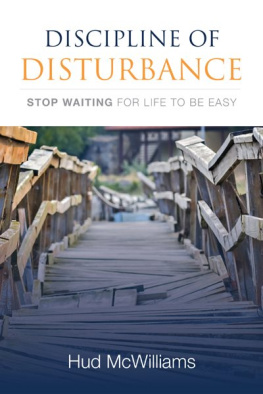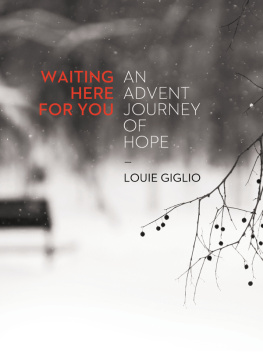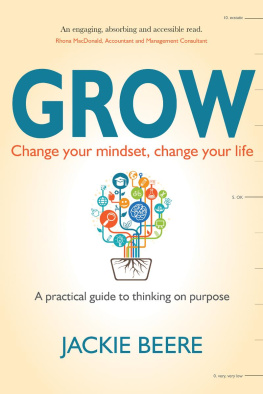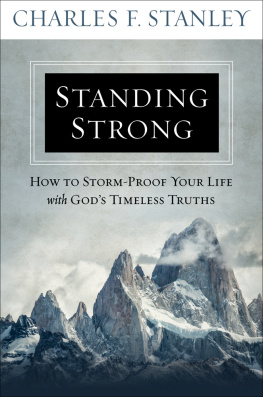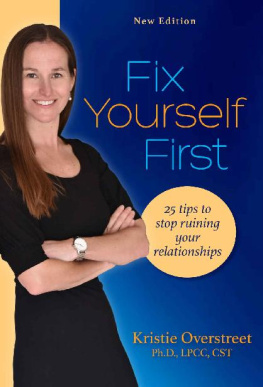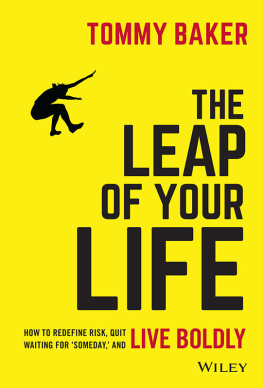PART I
Design: Gods Intent
PART II
Grace/Grief
PART III
Barriers
PART IV
Gods Goodness
CHAPTER 1
The Solution to Your Suffering Is Not What You Think It Is
M ost of us are committed to avoiding pain, and that commitment accounts for much of the pain we experience. This book is written for people who desire wholeness. It can be an overwhelming subject, yet it is needed if we are to embrace life as it was intended by our Maker and to experience a whole life that is essentially life-giving and joyful.
This subject often is buried under layers of experience and occupation without much reflection. Embracing wholeness, or even acknowledging that there may be more than we are aware of, requires us to make intentional decisions.
The process of growing toward a whole life is marked by a few components that establish its boundaries. For any of us to embrace life from this perspective, we will need at least some measure of these elements:
- Maturing into an ever-increasing state of being that is undamaged or is healed and increasingin responsibility for our own lives.
- Integrating into our being the restoration of places where we have been wounded. (We recognize that we all are wounded.)
- Becoming a contributing part of a community.
These three tasks are to be faced concomitantly. In order to move toward wholeness over the arc of a lifetime, you will need to be equipped in specific ways to do this work, which is not often modeled. And since there is no formula, we dont have the fallback position of comparison and copying. That means the hard work of growth rests squarely with each of us.
Ill incorporate some word pictures throughout this book to help you follow the threads through the conversation and begin to embrace the complexity that is a human life. A life well lived will be marked by joy and freedom attached to wholeness. This transcends your circumstances, which often is the most difficult part to comprehend.
First, Life Is Hard for a Reason
As we experience life, we must embrace the hardships that inevitably are part of the rhythm of living. Life is hard for a reason. Nothing has a natural tendency to go right, so we must shape our perspective accordingly. This takes some doing.
I like to think we are a bit like a house where the need for maintenance is a constant, from cleaning to repairs. We living beings need upkeep and maintenance as well, along with the added element of being nurtured. Like a house, we pick up dust and wear along the way. We know that dusting, for instance, is a never-ending process. The same is true for humans. We have to remove the clutter we have picked up on our way through life. The problem is that we become attached to these things, making the removal process a demanding one. The harshness of this process usually is misread as something that should be avoided, yet it is just this undertaking that is necessary for us to grow in a whole manner.
An image that accurately illustrates the process is the crucible. A crucible is used along with intense heat to purify various types of metal. The process yields an unencumbered product, which helps define how we achieve joy. Struggle and what we often think of as drudgery assist us in the journey toward life-giving wholeness.
This process is designed to produce two outcomes.
The first aspect is that no growth can take place without struggle.
Whether you are growing a business or a marriage, building a house and making it a home, or developing your life, all of these efforts demand a struggle to become what you hope them to be. For me, a crucible represents the struggle that is involved if growth toward wholeness is going to take place.
The second aspect is the necessity of deconstructing lies.
We grow accustomed to, and even attached to, certain lies. Whether the lies come from direct deception or from much more insidious sources, their effect is similar. The lie stops growth by diverting us from accessing the joy we are designed to live out of. Any time we embrace a lie as the truth, we are likely to promise ourselves we will do or not do something based on the lie. One of the most commonly shared lies is that relational rejection hurts, and often we first run into this when we are in the midst of puberty and then make and attach an internal pledge never to risk or be that open to relationship again. The rolling impact is that later in life we are lonely because we are honoring this hidden lie, and since we are not really conscious of where the lie came from, we simply perpetrate the lies effect and thin out our relationships by not being vulnerable. The core of intimacy is to be known and a lie like this essentially prevents us from that kind of openness, resulting in less likelihood of intimacy being available. Exposure is the only way through this and what breaks the lies hold.
Today I wrote this note to a client who had asked about lies:
With all trauma or wounds comes a message, which most often is twisted by the very wounding experience, whether or not we are aware. And, in fact, more often than not we are not conscious of this reality, so this message is the killer.
Sometimes, not often, the message is spot on and tells the truth in context, and then the event does not become toxic going forward. In other words, it is faced in the light, and in the moment [it is] embraced and owned, but in a matter-of-fact manner.
However, and this is the big however, most often when some aberration/wound/trauma happens to us or something is left out or omitted, the message that is attached is twisted and the product is a lie we begin to believe. Then we promise ourselves not to [fill in the blank], which functions as a pledge or vow, we begin dragging the past with us, not as part of our story but as a maker of our personality.
That may be way too complex, but I do not think you have to dig in the past. I believe it shows itself when you face what is occurring in the moment you are in.
That is why I want you to know that practicing healthy/life-giving skills in the present matters if you truly want to get loose from the network of lies foisted on you from childhood. If you want to break that bond and refute the vow you made, you need to access the joy that your heart and life were made for.
The real practice is to disarm the corrosive attachments, which I suppose involves facing forward and embracing the moment you are in. At the same time, recognize the intrusive thoughts that are lies. Spit on them and return to the joy God gives.
Second, Joy Is the Core Relationship
Joy is the sense of hope that comes directly from someone else delighting in your existence. Being wanted, known, accepted, and loved are no small items. The product of such joy is a wholeness that is larger than context and it is attached to maturing growth. I think of four contexts we all have found ourselves in at some time in life. One is a life-giving context where joy reigns and surprise is central. Humor and good jokes surprise us and thus are good parts of this joyful, life-giving space. Games should be fun, yet often they are robbed of joy by the demand to win instead of learning to play to your fullest, which is its own reward.
The second context is life-neutral. Nothing of significance is going on, and life is comprised mostly of this experience. Nothing bad happened, but then nothing really good happened either.
The third context consists of life-sucking experiences. These take place where you are given a context that is impossible to live by. Somehow the elements that are involved use you instead of delight in you. We are not objects to be used but rather responsible beings to be responded to.
Next page
